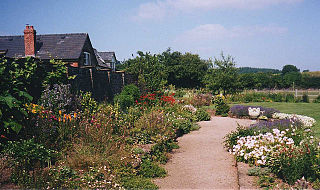
Dore Abbey is a former Cistercian abbey in the village of Abbey Dore in the Golden Valley, Herefordshire, England. A large part of the original medieval building has been used since the 16th century as the parish church, with remaining parts either now ruined or no longer extant.

John Abel was an English carpenter and mason, granted the title of 'King's Carpenter', who was responsible for several notable structures in the ornamented Half-timbered construction typical of the West Midlands.

Abbey Dore is a village and civil parish in Herefordshire, England, known for Dore Abbey, a 12th-century Cistercian abbey, which was expanded in the 13th century.
Pontrilas is a village in south Herefordshire, England, half a mile from the border with Wales. It is in the parish of Kentchurch and lies midway between Hereford and Abergavenny. In 2011 the main village contained 66 residential dwellings, as well as Pontrilas Business Park.

In architecture, a boss is a knob or protrusion of wood, stone, or metal.

The Golden Valley is the name given to the valley of the River Dore in western Herefordshire, England. The valley is a picturesque area of gently rolling countryside. It lies in the lee of the Black Mountains, Wales.

Abbey Dore Court is a country house in Abbey Dore, Herefordshire, England.

Christopher Rawlinson (1677–1733) of Carke Hall in Cartmell, Lancashire, was an English antiquary.
Reginald Boulers was a medieval Abbot of Gloucester, Bishop of Hereford and Bishop of Coventry and Lichfield.

Thomas Spofford was a medieval Bishop of Hereford and Abbot of St Mary's Abbey, York.

Ewyas Harold is a village and civil parish in the Golden Valley in Herefordshire, England, near the Wales-England border about halfway between Abergavenny, Monmouthshire, and Hereford. The population of this civil parish at the 2011 census was 883. It lies on the Dulas brook, and is contiguous with the neighbouring village of Pontrilas.

The Marches Way is a partially waymarked long-distance footpath in the United Kingdom. It runs for 351 kilometres (218 mi) through the Welsh–English borderlands, traditionally known as the Welsh Marches, and links the cities of Chester in the north and Cardiff in the south.
The Hoskyns Baronetcy, of Harewood in the County of Hereford, is a title in the Baronetage of England. It was created on 18 December 1676 for Bennet Hoskyns, Member of Parliament for Wendover, Hereford and Herefordshire. He was the son of the poet, lawyer and politician John Hoskins. The second Baronet was one of the founders of the Royal Society and served as its president from 1682 to 1683. The fourth Baronet fought under the Duke of Marlborough in the War of the Spanish Succession and also represented Herefordshire in the House of Commons. The twelfth Baronet was Lord Bishop of Southwell from 1904 to 1925.
Clive Young was a Church of England bishop. From 1999 to 2013, he was the Anglican Bishop of Dunwich, a suffragan bishop in the Diocese of St Edmundsbury and Ipswich.
Norman Stanley Rathbone was an Anglican priest in the second half of the 20th century.
Michael Edward Tavinor is a retired English Anglican priest who served as Dean of Hereford from 2002 to 2021.

The River Dore is a tributary of the River Monnow in Herefordshire, England.
John Duncumb was an English clergyman and antiquary. He is best known as the author of an unfinished county history of Herefordshire.
Edward Grey, D.D. was an Anglican bishop who served in the Church of England as the Bishop of Hereford from 1832 to 1837.
This page is based on this
Wikipedia article Text is available under the
CC BY-SA 4.0 license; additional terms may apply.
Images, videos and audio are available under their respective licenses.










